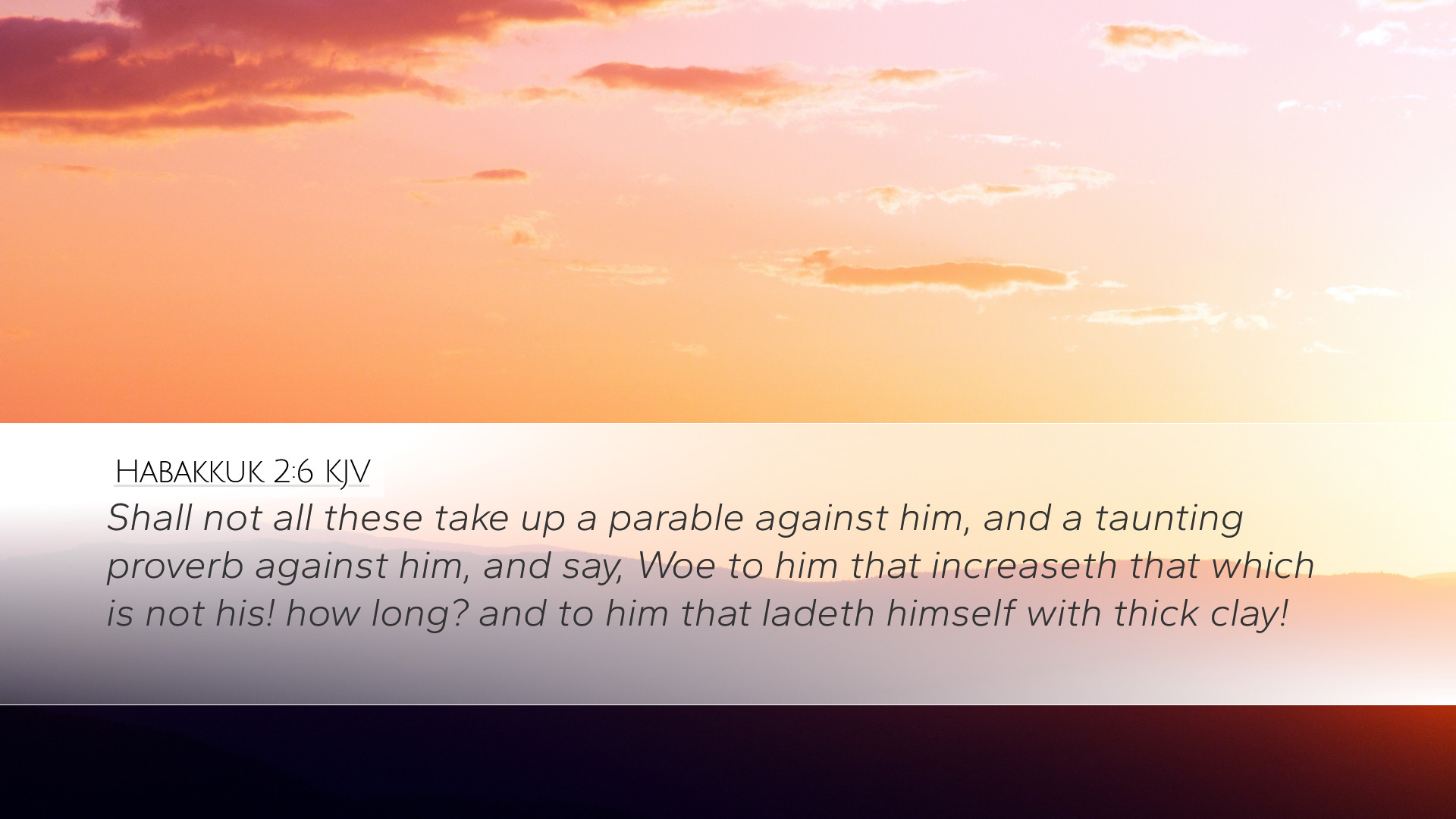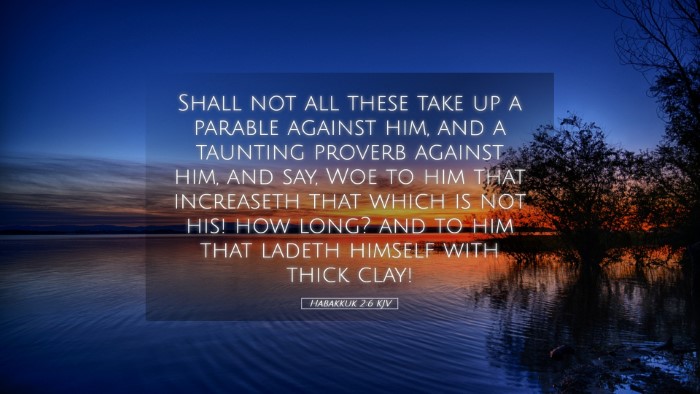Old Testament
Genesis Exodus Leviticus Numbers Deuteronomy Joshua Judges Ruth 1 Samuel 2 Samuel 1 Kings 2 Kings 1 Chronicles 2 Chronicles Ezra Nehemiah Esther Job Psalms Proverbs Ecclesiastes Song of Solomon Isaiah Jeremiah Lamentations Ezekiel Daniel Hosea Joel Amos Obadiah Jonah Micah Nahum Habakkuk Zephaniah Haggai Zechariah MalachiHabakkuk 2:6
Habakkuk 2:6 KJV
Shall not all these take up a parable against him, and a taunting proverb against him, and say, Woe to him that increaseth that which is not his! how long? and to him that ladeth himself with thick clay!
Habakkuk 2:6 Bible Commentary
Commentary on Habakkuk 2:6
Verse: "Shall not all these take up a parable against him, and a taunting proverb against him, and say, Woe to him that increaseth that which is not his! how long? and to him that ladeth himself with thick clay!"
Context and Overview
Habakkuk's prophecy is set during a tumultuous period in Israel's history, wherein the prophet grapples with the apparent triumph of injustice and the prosperity of the wicked. In Habakkuk 2, God responds to the prophet's inquiries about justice and divine timing, promising that the arrogance of the wicked will not withstand God's judgment.
Insights from Public Domain Commentaries
1. Matthew Henry's Commentary
Henry emphasizes the rhetorical nature of the verse, noting the "taunting proverb" as an expression of the people's response to the injustices they witness. The phrase "Woe to him" indicates a lamentation over those who oppress and rob others. Henry points out that the "thick clay" symbolizes the burdens of debt and sin that the oppressor carries, which will ultimately lead to their downfall.
Key Points:
- The proverb reflects the communal understanding of divine justice.
- Woe is pronounced upon those who seek to increase their riches at the expense of others.
- The imagery of "thick clay" relates to the burdensome consequences of greed.
2. Albert Barnes' Notes on the Bible
Barnes focuses on the implications of the verse for God's judgment. He suggests that the "taunting proverb" serves to mock the false security of the oppressor. Barnes notes how the phrase "increaseth that which is not his" underscores the idea of unjust gain and the inherent futility of such endeavors in light of divine retribution. He further discusses how the "thick clay" can be interpreted as both a metaphor for debt and as a symbolic representation of the weight of one’s own iniquities.
Key Points:
- The taunt signifies the inevitable fall of the oppressor.
- God's judgment will expose and dismantle false security.
- "Thick clay" serves as an allegory for sin and guilt.
3. Adam Clarke's Commentary
Clarke provides valuable insights into the language and structure of the verse. He comments on the cultural context within which these words were spoken, noting that the use of a parable reflects common methods of conveying moral lessons in Hebrew literature. His interpretation highlights the societal repercussions of greed, indicating that the collective voice against the oppressor reverberates through the community. The sense of community judgment plays an essential role in understanding the prophetic message of hope and vindication.
Key Points:
- The community's voice is united against injustice.
- The proverb serves as a cautionary tale for generations.
- The metaphorical use of language enhances the understanding of moral decay.
Theological Implications
Habakkuk 2:6 serves as a poignant reminder of God's commitment to justice. The condemnation of the oppressor resonates throughout Scripture, providing a framework for understanding the nature of sin and its aftermath. The verse invites readers to reflect on the social consequences of greed and injustice, encouraging spiritual leaders to address these issues within their congregations.
Application for Today
In applying the lessons from Habakkuk 2:6, pastors and theologians are urged to consider how contemporary society perpetuates cycles of injustice and materialism. The challenges presented by the text can serve as a lens for evaluating personal and communal behaviors, particularly in the context of stewardship and social responsibility. Encouraging a culture of accountability and prophetic witness can foster communities that reflect God’s justice and mercy.
Conclusion
Habakkuk 2:6 encapsulates the tension between divine justice and human action. Drawing from the insights of esteemed commentators such as Matthew Henry, Albert Barnes, and Adam Clarke enriches our understanding of this poignant text. As we reflect on its implications, may we be inspired to challenge injustices within our communities and align ourselves with God's transformative vision for the world.


